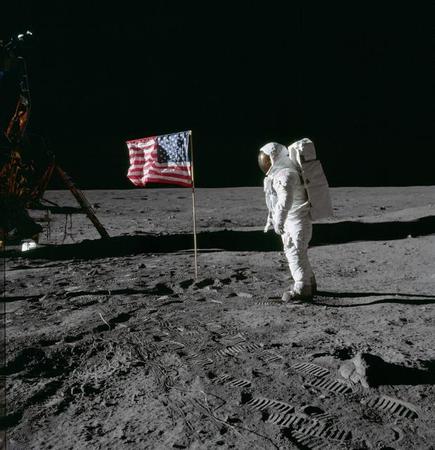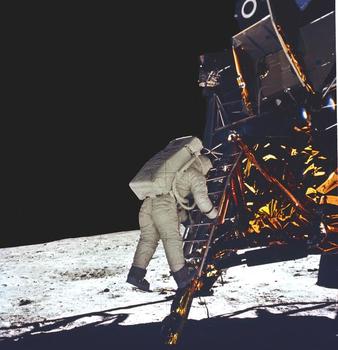On November 12th, exactly one month after its release in the UK, I finally got the chance to go and see First Man. Expectations for this film were high. Not only was it a dramatization of one of the most significant events in human history, but also it was the next film from Damien Chazelle, fresh off his Oscar win for La La Land. Starring Ryan Gosling as Neil Armstrong, the film is both a character study about grief as well as a procedural about the many dangerous missions that had to take place before NASA could even consider sending men to the moon.
Upon release, the film was the latest in a long line to get caught up in the culture war between President Trump and his critics. The film’s decision not to show the moment when the American flag was planted on the moon drew criticism from many who had yet to see the film. Trump said it was “a terrible thing," and that he wouldn't see the film as a result, suggesting its makers were embarrassed about it being an American achievement. The manufactured controversy helped Trump appeal to his base and portray those in the media as an out-of-touch liberal elite. After the film underperformed at the box office, many were quick to then attribute the blame to that omission.
Watching the film long after that conversation has died down shows just what a shame it would be if that were what comes to define it. Addressing that point first of all, nobody could watch this film and legitimately claim that it underplays America’s role. Nor do I think that the film’s box office underperformance can be solely attributed to the perception in some quarters that it had. While I do think the two are linked, they’re not in the way that’s been presented. Rather than a simple case of cause and effect, both are consequences of the film’s approach to its subject.
The film has a relatively understated demeanor, taking a leaf out of its protagonist’s book. By all accounts, Neil Armstrong is a humble and reserved figure, not prone to self-aggrandizement. While hitting all the beats you’d expect of a moon landing film, flag planting aside, it doesn’t deal in triumphalism in the traditional sense. The story that’s being told here is a subjective one, taking you not just into the cockpit but also into the helmet and then mind of Neil Armstrong. Death is what is presented as his motivation for space flight, as he grieves the tragic passing of his daughter Karen to a brain tumor. Its haunting specter then follows him throughout the training programme, as numerous lives are lost to the trial and error of just getting to the moon let alone landing on it.
Therefore, when the landing finally does come, the film’s focus is first and foremost on the fact that they’ve arrived safely. Secondly, it seeks to capture what could have been running through Armstrong’s mind as he took those first steps and looked back at Earth. In the context of the film, the decision not to show the planting of the flag doesn’t stand out, as it is artistically unimportant to the story that’s being told.
Upon release, the film was the latest in a long line to get caught up in the culture war between President Trump and his critics. The film’s decision not to show the moment when the American flag was planted on the moon drew criticism from many who had yet to see the film. Trump said it was “a terrible thing," and that he wouldn't see the film as a result, suggesting its makers were embarrassed about it being an American achievement. The manufactured controversy helped Trump appeal to his base and portray those in the media as an out-of-touch liberal elite. After the film underperformed at the box office, many were quick to then attribute the blame to that omission.
Watching the film long after that conversation has died down shows just what a shame it would be if that were what comes to define it. Addressing that point first of all, nobody could watch this film and legitimately claim that it underplays America’s role. Nor do I think that the film’s box office underperformance can be solely attributed to the perception in some quarters that it had. While I do think the two are linked, they’re not in the way that’s been presented. Rather than a simple case of cause and effect, both are consequences of the film’s approach to its subject.
The film has a relatively understated demeanor, taking a leaf out of its protagonist’s book. By all accounts, Neil Armstrong is a humble and reserved figure, not prone to self-aggrandizement. While hitting all the beats you’d expect of a moon landing film, flag planting aside, it doesn’t deal in triumphalism in the traditional sense. The story that’s being told here is a subjective one, taking you not just into the cockpit but also into the helmet and then mind of Neil Armstrong. Death is what is presented as his motivation for space flight, as he grieves the tragic passing of his daughter Karen to a brain tumor. Its haunting specter then follows him throughout the training programme, as numerous lives are lost to the trial and error of just getting to the moon let alone landing on it.
Therefore, when the landing finally does come, the film’s focus is first and foremost on the fact that they’ve arrived safely. Secondly, it seeks to capture what could have been running through Armstrong’s mind as he took those first steps and looked back at Earth. In the context of the film, the decision not to show the planting of the flag doesn’t stand out, as it is artistically unimportant to the story that’s being told.
However, as a result the film is not conventionally crowd-pleasing and that, more than anything else, is why the film financially underperformed. With a running time of nearly two and a half hours it also isn’t short and faced stiff competition from the likes of A Star is Born and Venom upon release. Marketed as an action movie, First Man doesn’t provide the thrills that mainstream audiences have come to expect. Instead, they were presented with something much more sombre and meditative. It’s still emotional, just in an unexpectedly melancholic way.
That’s not to say that the film skimps on spectacle. I wished I had seen it in IMAX as some of the space photography, particularly as the film reaches its climax, is breathtaking. From the cinematography through to Justin Hurwitz’s superb score, the film is a technical tour de force that deserves many Oscar nominations. Meanwhile, during some of Neil’s earlier flights there are sequences of pure horror, as the camera shakes with a ferocity that would make the Bourne films blush. In only a handful of films, Damien Chazelle has exhibited a total mastery of his craft.
In front of the camera the film has a strong supporting cast. The likes of Kyle Chandler, Jason Clarke and Corey Stoll are all such comforting screen presences, never failing to give a good performance. Meanwhile, Claire Foy brings a sense of humanity and perspective to proceedings, forcing her husband to reckon with the emotional consequences of his actions. However, this is undoubtedly Ryan Gosling’s show. While it’s easy to make fun of his mute performances and insinuate that there’s nothing there, the emotion that he conveys through his eyes and mannerisms is nothing short of phenomenal.
Gosling has certainly found a niche for himself playing emotionally reserved characters, however the silences here speak to a completely different set of emotions than the ones in films such as Blade Runner 2049 or Drive. Nobody is better in mainstream Hollywood at portraying introversion on screen, and as an introvert; I appreciated the film’s faithful portrayal of Neil Armstrong.
Come the film’s conclusion, I found myself moved in a much more bittersweet and profound way than I expected. Ultimately, the discussions about its politics and box office are nothing but false flags. This is a deeply human character study that deserves to be judged on its own terms. It may not be suitably exciting or patriotic for some, however there’s something to be said for the necessity of its sensitive and contemplative approach. Beautifully contrasting the intimate with the spectacular, it is one of the year’s very best films and I trust that history will be a kinder judge to it than the present.
By Movie Parliament Prime Minister,
Michael Dalton
That’s not to say that the film skimps on spectacle. I wished I had seen it in IMAX as some of the space photography, particularly as the film reaches its climax, is breathtaking. From the cinematography through to Justin Hurwitz’s superb score, the film is a technical tour de force that deserves many Oscar nominations. Meanwhile, during some of Neil’s earlier flights there are sequences of pure horror, as the camera shakes with a ferocity that would make the Bourne films blush. In only a handful of films, Damien Chazelle has exhibited a total mastery of his craft.
In front of the camera the film has a strong supporting cast. The likes of Kyle Chandler, Jason Clarke and Corey Stoll are all such comforting screen presences, never failing to give a good performance. Meanwhile, Claire Foy brings a sense of humanity and perspective to proceedings, forcing her husband to reckon with the emotional consequences of his actions. However, this is undoubtedly Ryan Gosling’s show. While it’s easy to make fun of his mute performances and insinuate that there’s nothing there, the emotion that he conveys through his eyes and mannerisms is nothing short of phenomenal.
Gosling has certainly found a niche for himself playing emotionally reserved characters, however the silences here speak to a completely different set of emotions than the ones in films such as Blade Runner 2049 or Drive. Nobody is better in mainstream Hollywood at portraying introversion on screen, and as an introvert; I appreciated the film’s faithful portrayal of Neil Armstrong.
Come the film’s conclusion, I found myself moved in a much more bittersweet and profound way than I expected. Ultimately, the discussions about its politics and box office are nothing but false flags. This is a deeply human character study that deserves to be judged on its own terms. It may not be suitably exciting or patriotic for some, however there’s something to be said for the necessity of its sensitive and contemplative approach. Beautifully contrasting the intimate with the spectacular, it is one of the year’s very best films and I trust that history will be a kinder judge to it than the present.
By Movie Parliament Prime Minister,
Michael Dalton


 RSS Feed
RSS Feed
